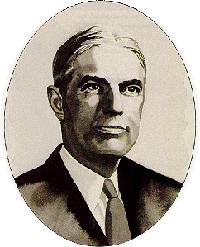WHO'S WHO - WILLIAM L. CLAYTON
 (1880-1966)
(1880-1966)
William L. Clayton, a native Mississippian, co-founded Houston’s Anderson, Clayton & Co., which became the world’s largest cotton merchandiser at a time when cotton was king. Clayton moved to St. Louis at 16 to enter the cotton industry. By 1904, he was assistant general manager of the American Cotton Company’s New York office. He teamed up with his brother-in-law Frank Anderson to buy and sell cotton but saw the need for more capital. They asked Frank’s brother Monroe to join them in forming Anderson, Clayton & Co. Monroe moved to Houston in 1907 to gain access to larger banks and the nearby Port of Galveston. The company moved its headquarters there in 1916.
An expert in foreign sales, Clayton led cotton exporters in providing warehouse facilities, insurance, credit, and other services formerly rendered only by European firms. In the 1920s, he led the fight that forced the New York Stock Exchange to accept southern delivery on futures contracts.
Clayton was a formidable voice in politics as well. He was a long-time advocate of a reciprocal trade agreement and joined the Office of the Coordinator of Inter-American Affairs under Nelson Rockefeller in 1940. Clayton went on to be named Assistant Secretary of Commerce, which placed him in charge of the Reconstruction Finance Corporation’s foreign activities. In 1944, Clayton was appointed Assistant Secretary of State for Economic Affairs. The adopted Texan became instrumental in the engineering of the European Recovery Program, otherwise known as the Marshall Plan.
While Clayton was away in Washington, Anderson, Clayton & Co. continued to set precedents in the field of cotton merchandising. With increased investments in cotton gins, feed factories, experimental seed farms, vegetable-oil mills, and other entities, the company continued to set itself apart from its competitors.
Anderson, Clayton & Co. no longer exists as a major corporation or family enterprise, having been a victim of the merger-and-acquisition frenzy of the late 1980s. A former subsidiary, Anderson Clayton Foods, still operates out of North Texas.
Clayton returned to Houston in 1947 where he set up the Clayton Fund. The organization contributed to a variety of religious, charitable, and educational institutions. Recipients include Johns Hopkins University, Tufts University, and the University of Texas.
In 1940, Clayton retired from taking an active role in the management of the firm, but maintained control of the company, which has become a Texas household name, through several trusts. He died in 1966.






